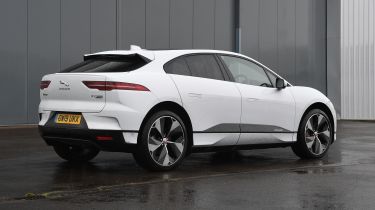BMW X5 hybrid vs Porsche Cayenne hybrid vs Jaguar I-Pace: safety and reliability
There are no undue safety concerns with any of these cars, but their long-term real-world reliability is still largely untested

Despite its premium status, BMW didn't perform well in the 2020 Driver Power owner satisfaction survey: its 26th-place overall finish out of 30 manufacturers was attributed to high running costs, interior comfort issues and driver visibility. While we can't argue with the first of these points, the X5 certainly addresses the latter two of these in our view. However, a relatively high 20.4% of owners reported a fault with their BMW – not terrible on the grand scheme of things but still worth bearing in mind.
Porsche didn't feature in the 2020 survey, but Jaguar fared well with a decent 12th-place finish – just ahead of Hyundai and not too far behind premium rival Volvo. Jaguar owners rated their cars highly for comfort, ride and handling, along with styling and acceleration – all of which the I-Pace attests to. However, owners have also noted the brand's troubles with infotainment and a number reported faults – an average share of 25.6%. Potential I-Pace owners should take comfort in the relative simplicity of electric cars over plug-in hybrid models.
All three cars are up-to-date in safety terms, with each manufacturer keen to bolster its SUV with the latest active safety and driver assistance technology. All three got a full five-star rating from Euro NCAP, with the Cayenne scoring strongest for adult protection (95%), the X5 claiming the best child protection score (86%) and the I-Pace doing best in the safety assist category (81%).
All X5 xDrive45e models get BMW's Active Guard Plus speed limit recognition, lane-departure warning and automatic emergency braking system as standard, plus all-round parking sensors and LED headlights. You'll have to add the Driving Assistant Professional pack to get all the best systems, however, like adaptive cruise control with stop/go functionality, speed-limit assistance, lane-keep assistance and other high-tech safety kit. It's a similar story on the Cayenne: autonomous emergency braking is standard, but you'll have to tick some options-list boxes to get adaptive cruise control or even a reversing camera. In each case it's worth ticking the boxes.
In comparison, the Jaguar's list of standard safety equipment looks generous: traffic-sign recognition, lane-keeping assistance, driver alertness monitoring, rear cross-traffic sensors and automatic emergency braking. SE cars like ours add blind-spot assistance, adaptive cruise control and autonomous emergency braking that works at higher speeds.


